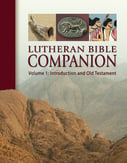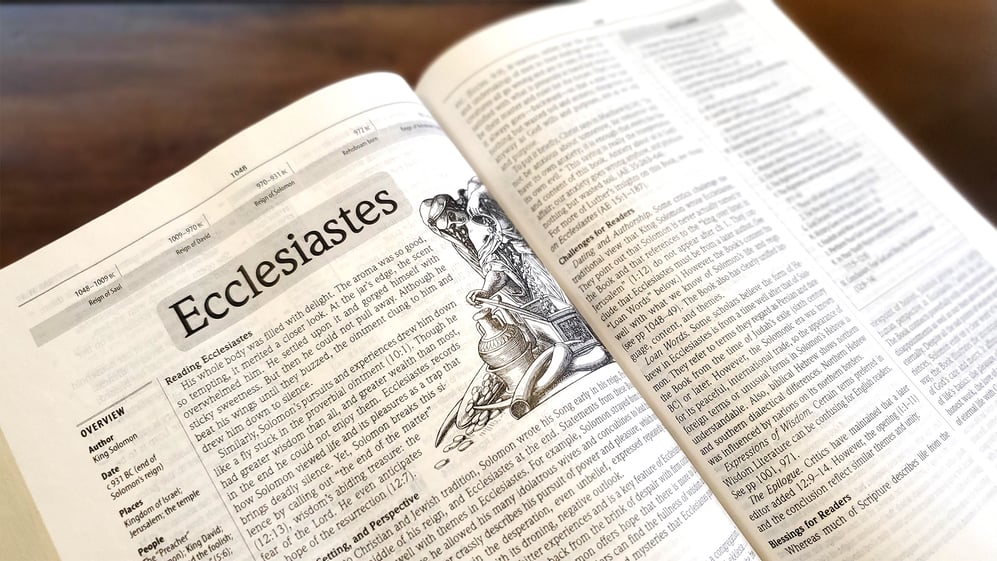The Books of Wisdom and Poetry are commonly used as guides for the lives of the Israelites in biblical times and us today. Wise sayings and proverbs help us in times of confusion, while psalms and other prayers can guide our worship and prayer life and how we speak to God. The following has been adapted from the Lutheran Bible Companion.
Jump to:
Introduction
The biblical term wisdom (Hebrew chokmah) occurs most often in Job, Proverbs, and Ecclesiastes (about three-fifths of all usages). Whereas numerous psalms recount the history of early Israel and draw wise observations from that history, the main Books of Wisdom and Poetry never talk about the earliest history of Israel (e.g., Abraham, Jacob, and Moses are never mentioned in Job, Proverbs, or Ecclesiastes). These Books of Wisdom and Poetry mention some of Israel’s important rulers (e.g., Proverbs mentions David, Solomon, and Hezekiah), but their main focus has to do with God’s orderly creation and living in harmony with that order.
Job
Overview of Job
The Book of Job mentions no events that can be synchronized with any other known history. There are, however, many indications that the story of Job is ancient. One of the main ones is the name itself, Job, or in Hebrew, Iyob. Although we know it also from later Arabic sources, it appears as early as approximately 2000 BC in an Egyptian Execration Text as ’ybm (mimated form), and thereafter frequently in the second millennium (in texts such as Amarna, Alalakh, Mari). The other names in the book are also appropriate to the second millennium BC.
This is the general period of the biblical patriarchs. The references in Ezekiel 14:14 and 20 to “Noah, Daniel, and Job” as paragons of righteousness also point in the same direction. About the antiquity of Noah, there is no question, and the name Dan’el is found in fourteenth-century Ugaritic legends (though there are good arguments for taking the figure here as the contemporary of Ezekiel too).
Purpose of Job
God never reveals to Job the ultimate reason for his trauma, namely the challenge from “the Satan.” When the Lord finally does respond to Job’s repeated requests—even demands—for a hearing, what He says is about as big a surprise as anything in the book. These divine speeches should not be searched
for the answer to the problem of suffering, as is often done (though, of course, in a broader sense they are a major part of the answer). The book is not a treatise leading by rational argument to a conclusion (a theodicy in any Western, philosophical sense of the term). God’s answer to Job addresses the
entire audience of readers or hearers. The overarching point of the book is
that the Lord is the Redeemer, despite what we may suffer in this life.
Psalms
Overview of Psalms
It is almost redundant to underscore the importance of the Psalter, whether in contemporary life or in the history of the Church or the synagogue (or the temple preceding both), whether in public worship or in private devotion. Different communities have employed the Psalms differently. Medieval monks chanted them daily. The Reformed churches exalted psalm paraphrases over “human” hymnody. Lutheran use centered on liturgical elements (Introits, Graduals). The general Protestant accent on individual piety tended to encourage more private use of the Psalter. But as the original use in church and public worship often lessened, the private use lost its urgency too—a process of secularization that Western Christians have not yet learned how to reverse.
Purpose of Psalms
The more topical, Western reordering of biblical books made the Psalter the
first of the “poetic” books. The Masoretes or their predecessors recognized
the Psalms (together with Job and Proverbs—but only these three) as poetry.
Hence, they furnished the Psalms with a somewhat different punctuation-cantillation system than used elsewhere in the Hebrew Bible. Since that system could not be reproduced in translation, the Septuagint’s reclassification of the Psalms was, no doubt, a happy means of advising the reader to recognize the different, poetic nature of the literature. However, until relatively modern times it seems to have escaped attention that far more of the Old Testament is poetry than either of these ancient traditions recognized (especially nearly all of the prophets, and thus—as bears constant emphasis—a high percentage of the entire Old Testament is poetry). The typographical distinction between poetry and prose must be reckoned as one of the major pluses in most modern translations.
Proverbs
Overview of Proverbs
Solomon transformed Jerusalem from a highlands city into a hub of international commerce. His father, David, captured Jerusalem as a Jebusite (Canaanite) stronghold and turned it into the capital of his growing kingdom. Solomon’s marriage to a daughter of Pharaoh demonstrated his international standing, wedding the culture that previously enslaved Israel. Herds of horses followed from Egypt and from Kue in Asia Minor. Solomon traded the herds and other goods to Hittites and Syrians to the north and east. He ruled over his nearer neighbors: Philistines, Moabites, Ammonites, Edomites, and Sidonians. Tyrian workmen crafted the cedar beams for the temple Solomon built in the Lord’s name. Sheban caravans brought spices from the distant Saudi and African coasts. Solomon’s leadership made Jerusalem an international landmark.
Along with goods from distant lands came people with different ideas. Biblical wisdom notes the common themes observed from the different cultures that explored God’s orderly creation, while warning against the corruptions of foreign influence. Proverbs conveys these tensions of fascination and revulsion,
seeking to distinguish the foolish from the wise. The beginning of biblical wisdom is “fear of the LORD” (e.g., 9:10), which means trust in God whose Word made Israel great.
Purpose of Proverbs
The stated purpose of the Book of Proverbs is to provide its readers with godly wisdom (1:2–7) so that they avoid the self-destruction that is sin or foolishness. The introduction to the collection of proverbs by King Hezekiah’s men provides a more specific context in which the words were used: the preparation of young men for the royal court. However, much of Proverbs describes life and choices at street level, making the collection attractive to a general audience and not just to the elite.
Ecclesiastes
Overview of Ecclesiastes
The Hebrew title, “Qoheleth,” is obviously based on the superscription (1:1), “The words of the Preacher [Qoheleth], the son of David, king in Jerusalem.”
The form qoheleth appears nowhere else in the Bible besides its seven occurrences in this book. It is a feminine form, which is usually understood as an abstraction—in this case an office, function, or a title (there are parallels to that usage). However, with one exception (7:27) a masculine verb form (predicate) follows in the text, presumably because the office was always filled by a man. It appears that the author of the book himself used the title as a pen name. Thus, it is an appropriate title for both the author and the work. The Greek translation is “Ecclesiastes,” and its English equivalent would mean “Preacher.”
The name Solomon is never explicitly used, but is clearly implied in the superscription “son of David, king in Jerusalem” (1:1) and similarly in 1:12 and 2:9. Various other allusions in the book plainly point in the same direction: the author’s “great wisdom” (1:16), massive wealth, many servants (2:4–8), etc. Until modern times, there was only a minimal question about it.
Purpose of Ecclesiastes
Ecclesiastes is written as a public address to the wise in which the speaker demolishes common opinion as “vanity of vanities” in order to prepare his hearers for a higher and truer wisdom. One of the puzzling characteristics of the work is its frequent alternation of viewpoint, from what at least appears to be rank agnosticism to very traditional, orthodox-sounding assertions—and back again. Already the rabbis were concerned about what appeared to be contradictions. Some commentators have attempted the explanation that we have reflected here the vacillation in the author’s own mind, his dialogue with himself as he struggled (barely successfully) to staunch the rising tide of skepticism about traditional values.
Song of Solomon
Overview of Song of Solomon
The Song of Solomon celebrates love, a common theme for all people of all times. What distinguishes the Song, however, is the way it connects human love
to God’s greater love in a poetry that mingles the earthly with the heavenly, the royal with the rural, and the ordinary with the eternal. These elements of the Song invite the reader to see something more than boy-meets-girl, and even something more than ruler-meets-servant. If love is “strong as death” and human passion shares in “the very flame of the LORD” (8:6), the meaning of the Song ascends beyond domestic life in ancient Israel.
Purpose of Song of Solomon
The Song celebrates God’s gift of faithful passion, blessed in the context of marriage. The poem, apparently delivered before the “daughters of Jerusalem” (1:4–5) and perhaps others, displays the joys of wedded love and the value of waiting to consummate the marriage. Read in its national and canonical significance, the song celebrates God’s love in Christ for His Church.
Blog post adapted from Lutheran Bible Companion, Volume 1: Introduction and Old Testament © 2014 Concordia Publishing House. All rights reserved.
Scripture: ESV®.
 To learn more about the Books of Wisdom and Poetry, read the Lutheran Bible Companion.
To learn more about the Books of Wisdom and Poetry, read the Lutheran Bible Companion.













